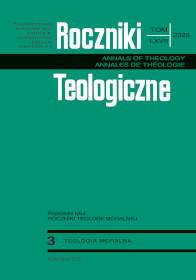Kontynuacja myśli Humanae vitae w posynodalnej adhortacji Amoris laetitia czy nowa interpretacja moralności?
Continuing the Thought Humanae vitae in the Post- -synodal Adhortation Amoris laetitia or a New Interpretation of Morality?
Author(s): Jarosław WojtkunSubject(s): Christian Theology and Religion, Theology and Religion, Systematic Theology
Published by: Towarzystwo Naukowe KUL & Katolicki Uniwersytet Lubelski Jana Pawła II
Keywords: marriage; norm; sin; conscience; law of gradation
Summary/Abstract: 50 years after the publication of the encyclical Humanae vitae, there was a demand to read it again in the light of the method proposed by Pope Francis in the exhortation Amoris laetitia. The new reading of the teachings of Pope Paul VI should take into account a new perspective: not from moral norms, but from the description of the reality in which the spouses find themselves. This new reading optics of Humanae vitae outlined in Amoris laetitia raises the question: is the teaching of Pope Francis a continuation or a new interpretation of morality? There are clear differences in taking such issues as: the essence of sin, its horizontal and vertical dimension, the existence of internally evil acts. Contrary to Paul VI, Francis takes the question of conscience and its role in moral choices. It is hard to resist the impression that the concept of creative conscience, definitely rejected by John Paul II, appears in the moral justifications of Pope Francis. We can also come across fragments of Pope Francis' exhortation, which may prove that he was on the side of the concept of the gradation of law, also rejected in the teaching of the Church so far. Various ways of interpreting certain aspects of moral teaching lead to the conclusion that the exhortation of Francis in many points does not indicate the continuation of the moral doctrine, but is a proposal for a new paradigm of morality.
Journal: Roczniki Teologiczne
- Issue Year: 67/2020
- Issue No: 3
- Page Range: 57-74
- Page Count: 18
- Language: Polish

